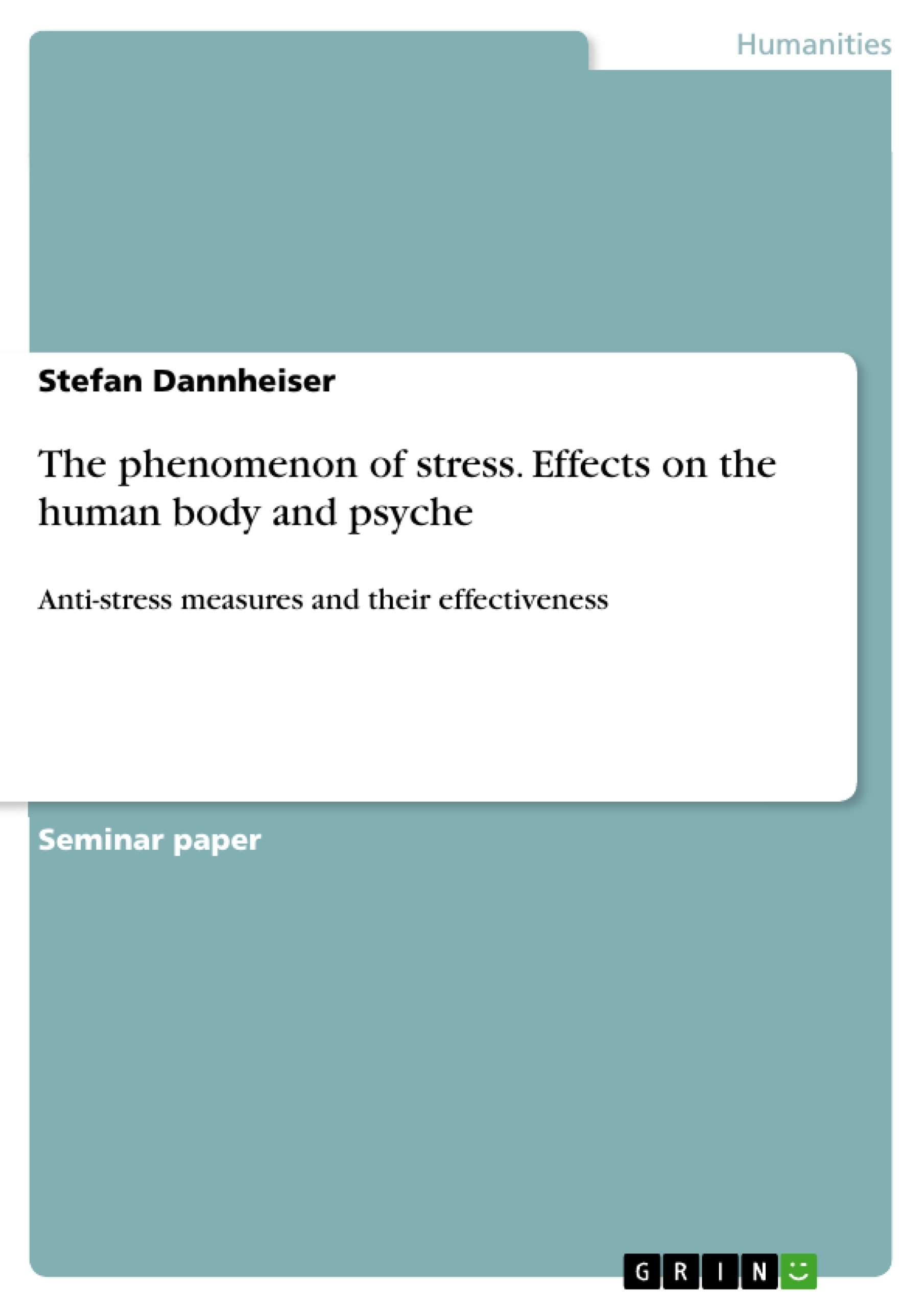The reason to write this paper about stress was obvious to me. Like many students, I also suffer from stress. Whether exam stress, performance or time pressure. All this may not have a positive effect on the life of a student.
The consequences are headaches, inner restlessness, irritability, nervousness, which in turn has a negative effect on performance - a vicious circle.
In my work I would like to deal with the phenomenon of stress in order to learn something for my everyday life and how to deal with stress.
In the first section I will clarify what is generally understood by stress or what stress actually is. Under point 2.1 I will first develop a definition of the term as a basis for further discussion of the topic. Furthermore, in the following section 2.2. I will introduce two of the most well-known stress models or theories. On the one hand there is the General Adaptation Syndrome according to Selye and on the other hand the Transactional Stress Model according to Lazarus. Finally, I differentiate the four levels of stress reaction in section 2.3.
In section 3 I show different stress reactions and their possible negative consequences on health. To mention are at this point not diminished arousal, chronic load, weakened immune authority as well as health risk behavior.
In the last part of my work I deal under point 4 with various anti-stress methods. I will present different methods of stress management or prevention, such as physical exercise training, muscle and breath relaxation, hatha yoga and autogenic training.
Finally, I will comment on the topic of stress as well as on the described anti-stress measures.
Inhaltsverzeichnis (Table of Contents)
- Introduction
- What is stress?
- Definitions
- Stress models
- General adaptation syndrome according to Selye (phases of stress response)
- Transactional stress model according to Lazarus
- Levels of stress response
- Cognitive-emotional level
- Behavioral level
- Vegetative – hormonal level
- Muscular level
- Stress reactions and health consequences
- Undegraded excitation
- Chronic stress
- Weakened immune competence
- Health risk behaviour
- Antistress Models (measures)
- Physical de-tension
- Physical exercise training
- Muscle relaxation
- Breath relaxation
- Hatha Yoga
- Autogenic training (AT)
- Conclusion
Zielsetzung und Themenschwerpunkte (Objectives and Key Themes)
This term paper explores the phenomenon of stress, its effects on the human body and psyche, and effective anti-stress measures. The author aims to gain a deeper understanding of stress and its impact, and to identify practical strategies for stress management.
- Defining stress and its various types
- Examining different stress models and theories
- Analyzing the physiological and psychological effects of stress
- Identifying key factors that contribute to stress
- Presenting and evaluating different anti-stress measures
Zusammenfassung der Kapitel (Chapter Summaries)
The introduction establishes the author's personal connection to the topic of stress, highlighting its impact on student life. It outlines the structure of the paper, which will explore the nature of stress, its consequences, and potential solutions.
Chapter 2 delves into the definition of stress, distinguishing between distress and eustress. It introduces two prominent stress models: Selye's General Adaptation Syndrome and Lazarus's Transactional Stress Model. This chapter also explores the four levels of stress response, encompassing cognitive-emotional, behavioral, vegetative-hormonal, and muscular aspects.
Chapter 3 focuses on the negative health consequences associated with stress, including undegraded excitation, chronic stress, weakened immune competence, and health risk behaviors.
Chapter 4 presents a range of anti-stress measures, including physical de-tension, physical exercise training, muscle relaxation, breath relaxation, Hatha Yoga, and autogenic training.
Schlüsselwörter (Keywords)
This paper focuses on the following key concepts: stress, distress, eustress, general adaptation syndrome, transactional stress model, stress response, stress reactions, health consequences, anti-stress measures, physical exercise, relaxation techniques, Hatha Yoga, autogenic training.
- Arbeit zitieren
- Stefan Dannheiser (Autor:in), 2004, The phenomenon of stress. Effects on the human body and psyche, München, GRIN Verlag, https://www.hausarbeiten.de/document/1190345


